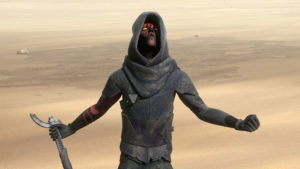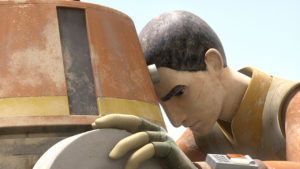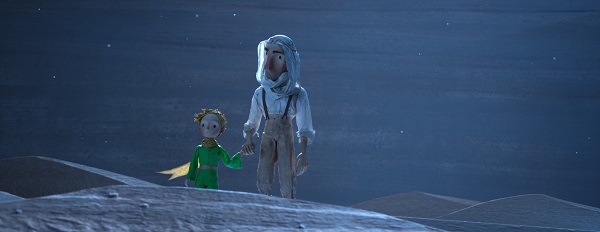Star Wars is a cinematic icon, but it is much more than its movies. Blaine and Josh dive deep into the universe of Star Wars Rebels, the fantastic animated show on Disney XD, with reviews of the third season of this exciting series. As a show aimed at kids, but also clearly for the kid in every adult Star Wars fan, they’ll also have a discussion section to talk about the themes covered in each episode.
[divider top=”no”]
 With a top-billed showdown that piqued the attention of even the most casual of fans,Twin Suns will undoubtedly go down as one of the most iconic moments in Star Wars lore. Ever since Obi-Wan cut him in twain in the waining years of the Republic, Darth Maul—or simply, Maul, as he would come to prefer in his latter years—has sought vengeance. In The Clone Wars, the bloodthirsty Zabrak got a taste of revenge when he killed Obi-Wan’s friend and love interest, Duchess Satine Kyrze, yet it was not enough; Maul wanted to destroy the man who mangled his body and caused him to fall from Palpatine’s graces. But it would take him 20 Standard years to find another opportunity to cross blades with his his old foe.
With a top-billed showdown that piqued the attention of even the most casual of fans,Twin Suns will undoubtedly go down as one of the most iconic moments in Star Wars lore. Ever since Obi-Wan cut him in twain in the waining years of the Republic, Darth Maul—or simply, Maul, as he would come to prefer in his latter years—has sought vengeance. In The Clone Wars, the bloodthirsty Zabrak got a taste of revenge when he killed Obi-Wan’s friend and love interest, Duchess Satine Kyrze, yet it was not enough; Maul wanted to destroy the man who mangled his body and caused him to fall from Palpatine’s graces. But it would take him 20 Standard years to find another opportunity to cross blades with his his old foe.
As much as it is an epic showdown, Twin Suns is also a desert wandering narrative in the tradition of Exodus, where Moses led the disobedient sons and daughters of Jacob for 40 years. The episode opens to a delirious Maul ambling aimlessly through the sands of Tatooine: “Lost, lost!” he cries. Unwilling to allow his journey to come to an anticlimactic end in this barren wasteland, Maul has an idea; he will use a Sith holocron to lure young Ezra Bridger, who, in turn, will flush out Obi-Wan. Perhaps, then, in addition to its allusions to Exodus, Twin Suns also bears echoes of the New Testament narrative in which Satan tempts Christ in the Judean Desert.
In the Bible, the desert is often depicted a crucible of sorts—a place where faith is forged, tested, refined, or reified. And this certainly proves to be the case for the young Ezra Bridger, who travels to Tatooine in direct disobedience of Hera’s orders for him to stay put and help the squadron prepare for their attack on Lothal. Upon arrival, Ezra finds the sands of Tatooine unforgiving and harsh, and he and the stowaway Chopper almost die in a violent sandstorm. In a sense, therefore, it’s possible to view Ezra and Chopper’s desert wanderings—and encounter with Tuscan Raiders—as an Israel-esque punishment for his sin of disobedience; and while there is likely a modicum of truth in that interpretation, it’s important to note that this desert experience is also the circumstance through which Ezra truly understands the value of the family he has on Lothal and, more significantly, the monumental significance of the cause with which he is aligned. Here we see Star Wars mirror the stories of old, where the emptiness of the desert gives way to something greater.
Additionally, Twin Suns proves to be a remarkably allusive episode, as even the climatic duel hearkens back to the samurai films of Akira Kurosawa, to which and whom Star Wars is eternally indebted. Maul and Obi-Wan fight for mere seconds before the latter deals a fatal blow to the former. And indeed, Obi-Wan’s technique and strategy here plays like something straight out of Yojimbo (1961) or Sanjuro (1962); his swift, precise, and unadorned strikes serve as a striking contrast to the stylized flourishes of Maul’s blade.
On a strictly narrative level, the brevity of the Maul-Kenobi fight makes perfect sense. The two have crossed blades on several occasions, and old Ben has grown in both his knowledge of The Force and his skill with a lightsaber since their last encounter. Maul, on the other hand, has stagnated. He continues to act out of harmful and wrongheaded motivations (more on this shortly), and he tries to take down Obi-Wan with the same move with which he killed Qui-Gon Jinn all those years ago, showcasing his lack of growth and proving to be his downfall.
The fatally wounded Maul falls toward the ground only to be caught and consoled by Obi-Wan. In his final moments, Maul asks if the person Obi-Wan is  protecting is the Chosen One, and he receives an affirmative response. “He will avenge us,” Maul gasps with his final breath, having ostensibly received some respite from his lifelong rage. In the end, however, Maul’s death still proves to be an incredibly tragic one. For the entirety of his life, Maul has lived a life motivated by vengeance and revenge. The second issue of Cullen Bunn’s Darth Maul miniseries comic—which is set before the events of The Phantom Menace—depicts its titular character as one fueled by a desire to serve as an avenging angel for the Sith by exterminating the Jedi. In The Clone Wars, he seeks revenge against the Sith who betrayed him, and in Rebels, he wants a bit of all of the above. His goals may change, but his motivation stays the same. Vengeance is the name of the game for this son of Dathomir, and he would likely find no solace in the kind of hope offered by Luke Skywalker—the one who cast down his lightsaber at Palpatine’s feet.
protecting is the Chosen One, and he receives an affirmative response. “He will avenge us,” Maul gasps with his final breath, having ostensibly received some respite from his lifelong rage. In the end, however, Maul’s death still proves to be an incredibly tragic one. For the entirety of his life, Maul has lived a life motivated by vengeance and revenge. The second issue of Cullen Bunn’s Darth Maul miniseries comic—which is set before the events of The Phantom Menace—depicts its titular character as one fueled by a desire to serve as an avenging angel for the Sith by exterminating the Jedi. In The Clone Wars, he seeks revenge against the Sith who betrayed him, and in Rebels, he wants a bit of all of the above. His goals may change, but his motivation stays the same. Vengeance is the name of the game for this son of Dathomir, and he would likely find no solace in the kind of hope offered by Luke Skywalker—the one who cast down his lightsaber at Palpatine’s feet.
Returning once again to this desert narrative motif, therefore, we see in the show’s final moments that if Maul is a kind of Devil-in-the-wilderness figure, Obi-Wan is John the Baptist—the one who paves the way for someone greater than himself.
John Williams’s Force Theme swells as a young Luke Skywalker darts across the frame, and we know that a new hope is on the way.
[divider top=”no”]
REBELS DEBRIEF
Star Wars Rebels is a family show. Parents love watching as much as their kids. Infusing the spiritual with the fantastic and adventurous, Rebels continues the spirit of what makes Star Wars great. In order to foster the young minds and hearts of your Reel World Theologians, each week there are questions you can use during or after the show to talk about with your kids. Enjoy the show and then enjoy conversation, but always remember that story is powerful and Star Wars Rebels is not mindless.
- Why doesn’t Obi-Wan want to fight with Maul?
- Why do you think Maul is comforted by the fact that someone will avenge him?
[divider top=”no”]
REBELS TRIVIA
- In this episode, Ezra is the same age as Luke.
- According to starwars.com, the animators actually used Ezra’s animation model for Luke’s appearance


